|
 Secure Site
Secure Site
|
 |
Archive for the 'Meditation Timers' Category
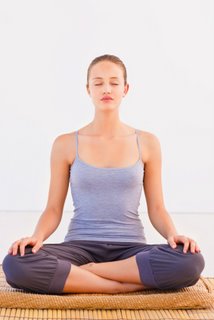 how not to fall asleep during mindfulness practices Why Not Sleep?
The practice of systematic relaxation is a time for quiet observation of the body. In practical terms, this consists of bringing our awareness to different parts of the body in an established sequence. It’s a bit like shining a flashlight around a dark room and taking an inventory of what is there. The more we shine the light of awareness around, the more familiar we become with our bodily furniture and its arrangement. Giving attention to each part of the body brings our awareness to habitual patterns of muscle tension and highlights areas that might need a little extra attention during asana practice.
There is so much in our room (the body) that we can easily overlook something. That is one reason a system is essential to the experience. Having a set sequence to follow ensures that we don’t miss any part. Following the same sequence every time creates a pattern for the mind to follow. With repetition, this pattern becomes ingrained in the mind. And when this happens, you can devote less of your mental energy to remembering the sequence and are free to concentrate fully on more subtle aspects of the self.
Systematic relaxation refreshes the body and mind, but it has more important implications for yoga practice. It is a deceptively simple process, but diligent practice can open the door to a rich interior landscape. When done after asana practice, it helps the body integrate the subtle changes induced by the postures and reinforces those changes on a deeper level. As a method of drawing attention inward (pratyahara), it helps the transition into formal meditation practice. And perhaps most important, it encourages a relaxed, observant state of mind in daily life.
None of these things happen, however, when we are sleeping. The benefits of systematic relaxation come from the attention we bring to the practice itself. If that isn’t enough to keep you awake during relaxation practices, consider the effect your nap might have on those around you in a class: it’s really hard to concentrate on a subtle experience of the self when the person next to you is engaged in some not-so-subtle snoring.
adapted from Yoga International, January/February 2006
Use our unique “Zen Clock” which functions as a Yoga & Meditation Timer, as well as a gentle Alarm Clock. It features a long-resonating acoustic chime that brings your meditation or yoga session to a gradual close, preserving the environment of stillness while also acting as an effective time signal. Our Yoga Timer & Clock can be programmed to chime at the end of the meditation or yoga session or periodically throughout the session as a kind of sonic yantra. The beauty and functionality of the Zen Clock/Timer makes it a meditation tool that can actually help you “make time” for meditation in your life. Bring yourself back to balance.
 Timers and Clocks with Chime in Bamboo, Walnut, Maple, and Black Lacquer Now & Zen’s Yoga Timer Store
1638 Pearl Street
Boulder, CO 80302
(800) 779-6383
Posted in Meditation Timers, Meditation Tools, mindfulness practice
 meditation As time progresses, you may find that you enjoy the positive results of meditation—increased joyfulness, clarity, and awareness—as much as you enjoy the relief you experience from releasing the physical, nervous, and mental symptoms of stress. Meditation is therapeutic from the beginning. It helps relax the autonomic nervous system, and thus provides freedom from muscular tension as well as mental stress. A person of meditation gradually attains a tranquil mind, and this helps the immune system by limiting its reaction to stress and strain. You will find that even a few weeks’ sincere effort will help you control your appetites to a certain degree, and even your reactions such as anger. Meditation will also decrease your need for sleep and energize your body and mind; it is a systematic means for enhancing your innate talents. I have observed this result with students from all walks of life.
Meditation also has a positive influence on health. In the modern world, scientists have begun to recognize that most diseases can be classified to some degree as psychosomatic, as having their origin in thoughts and emotions—or at least being influenced by them. And if disease originates in your mind and your emotional reactions, how can an external therapy alone restore your health? You will become dependent on a therapist or physician for help if you do not seek to understand your own mind and emotions. In contrast, meditation makes you self-reliant and helps you attain the inner strength you need for dealing with all of life’s problems.
adapated from Yoga International, by Swami Rama
Use our unique “Zen Clock” which functions as a Yoga Timer. It features a long-resonating acoustic chime that brings your meditation or yoga session to a gradual close, preserving the environment of stillness while also acting as an effective time signal. Our Yoga Timer & Clock can be programmed to chime at the end of the meditation or yoga session or periodically throughout the session as a kind of sonic yantra. The beauty and functionality of the Zen Clock/Timer makes it a meditation tool that can actually help you “make time” for meditation in your life. Bring yourself back to balance.
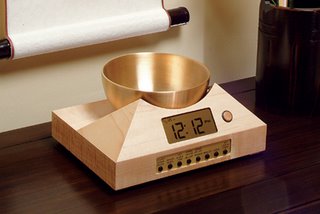 Meditation Tools Now & Zen – The Singing Bowl Meditation Timer Store
1638 Pearl Street
Boulder, CO 80302
(800) 779-6383
Posted in Meditation Timers, Meditation Tools, mindfulness practice
 meditation How important is it to sit precisely at the same time each day? The discipline of maintaining a fixed meditation or prayer time is extraordinarily beneficial. That’s why this practice is maintained by so many traditions, from Islam with its calls to prayer, to the Divine Office (matins, lauds, etc.) that measures the day for many Christian monks and nuns.
But maintaining an unwavering time for meditation demands a level of discipline and detachment from affairs that may not be practical—or even desired. For those of us with families, there are many occasions when our responsibilities may conflict with our meditation time. So, while a fixed time for meditation is certainly praiseworthy, it may not be the way your personal practice evolves.
As an experiment, try sitting at approximately the same time each day. You’ll soon develop a rhythm that will gradually reinforce itself. After you’ve tried it for a while, you can then decide how strictly you would like, or are able, to observe a fixed meditation time.
Although meditation can be done in almost any context, practitioners usually employ a quiet, tranquil space, a meditation cushion or bench, and some kind of timing device to time the meditation session. Ideally, the more these accoutrements can be integrated the better. Thus, it is conducive to a satisfying meditation practice to have a timer or clock that is tranquil and beautiful. Using a kitchen timer or beeper watch is less than ideal. And it was with these considerations in mind that we designed our digital Zen Alarm Clock and practice timer. This unique “Zen Clock” features a long-resonating acoustic chime that brings the meditation session to a gradual close, preserving the environment of stillness while also acting as an effective time signal.
adapted from Yoga International by Rolf Sovik, May/June 2007
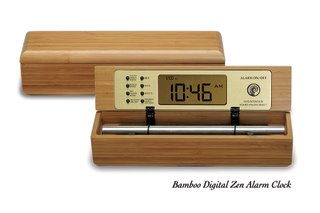 bamboo meditation tools Now & Zen – The Meditation Timer Store
1638 Pearl Street
Boulder, CO 80302
(800) 779-6383
Posted in Meditation Timers, Meditation Tools, mindfulness practice, Well-being
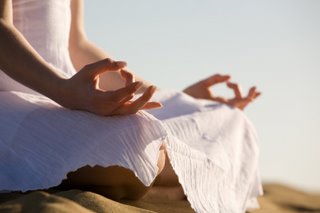 finding balance Myth: Imbalance will result in disaster.
Truth: Imbalance is opportunity.
Maybe you sense that your balance is slipping. Put those moments in perspective. We have to occasionally lose our balance in order to regain it. The mistake we often make is accepting our imbalances as part of who we are — giving up instead of trying to recover balance.
You may not want to believe you’ve taken on too much, for instance, because you want to do it all and are hesitant to let anything go — whether it’s a job, obligation, or opportunity. Consider what kinds of imbalances have been affecting you, physically, mentally, emotionally, or spiritually; pay attention to when and how you experience it.
When one area of your life is imbalanced, it can affect the others. Rather than view your imbalance as a mistake to fix, see it for what it is: an opportunity to rediscover balance in a new way.
Use our unique “Zen Clock” which functions as a Yoga Timer. It features a long-resonating acoustic chime that brings your meditation or yoga session to a gradual close, preserving the environment of stillness while also acting as an effective time signal. Our Yoga Timer & Clock can be programmed to chime at the end of the meditation or yoga session or periodically throughout the session as a kind of sonic yantra. The beauty and functionality of the Zen Clock/Timer makes it a meditation tool that can actually help you “make time” for meditation in your life. Bring yourself back to balance.
adapted from Body + Soul
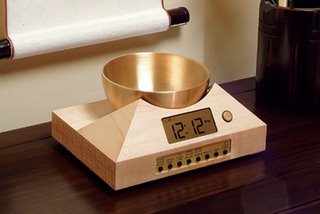 Singing Bowl Meditation Timers and Clocks Now & Zen’s Singing Bowl Meditation Timer Store
1638 Pearl Street
Boulder, CO 80302
(800) 779-6383
Posted in Meditation Timers, Meditation Tools, mindfulness practice, Well-being
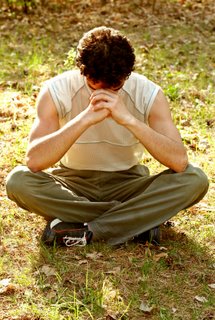 use your chime timer to practice breathing Fall is the season when the lungs, believed to harbor sadness and grief, are most vulnerable, according to Chinese medicine. In response to cold, dry weather, they begin to constrict. To keep yours healthy and strong as cold and flu season approaches, Ni suggests this breathing exercise: Sit with your spine tall and your hands on your abdomen. Draw in a deep breath for a count of 10, expanding your abdomen and then filling your lungs. Exhale in reverse for another 10 count, squeezing out all the air you can. Set your Chime Timer by Now & Zen for 15 minutes and continue until the calming chime strikes.
adapted from Wholeliving.com, October 2010
The Zen Alarm Clock is a consciousness-raising tool. No material object can actually raise your consciousness, but you can use information and devices such as this clock to stimulate your growth. The Zen Alarm Clock can effect your awareness in a variety of positive ways, all of which require your participation.
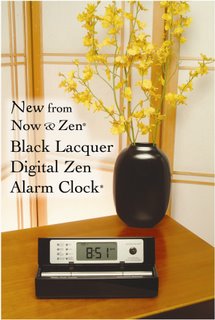 Chime Timers, time your wellness practice with a calming chimes
Now & Zen – The Zen Chime Timer Store
1638 Pearl Street
Boulder, CO 80302
Posted in intention, Meditation Timers, Meditation Tools, mindfulness practice, Well-being
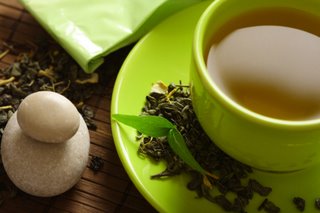 meditative tea ceremony Prepare for Tea During The Winter Season.
In one traditional Japanese tea ceremony, guests are met at the gate by their host and led silently through a garden to the tea room, signifying a departure from the everyday world and an entrance into a spiritual realm.
You probably don’t have a dedicated tea room, but you too can create a space in your afternoon for disconnecting from the day’s stresses, whether you’re at the office or at home. Here’s our simple step-by-step approach to creating your own personal tea ceremony.
Dedicate a Space
This can mean moving to another room, a favorite chair, or just to the other side of your desk — or simply clearing a space for tea on your table or work space. You might consider using a place mat or a tray to visually set your tea space apart from everything else.
Set the Stage
A tea ceremony is about atmosphere. Light a candle or play music to set the mood. If you’re in a busy office, just close your eyes and listen to your breath for a few minutes to switch gears and set the tone.
Select Your Tea.
Bring some intention to your choice. What are you in the mood for? A mild, grassy green? A refreshing peppermint? A rich, vibrant oolong or black tea? As Confucius said, “Let your palate be your guide.”
Use Your Favorite Accoutrements
The personal objects you use for tea making will help make this practice your own. Whether it’s a pretty mug, an iron teapot, or a favorite infuser, using something special for your tea ritual inspires a ceremonial feel.
“The Zen Alarm Clock & Chime Timer’, uses soothing acoustic chimes that signal it’s time – gently and gradually.
Rather than an artificial recorded sound played through a speaker, the Zen Clock features an alloy chime bar similar to a wind chime. When the clock’s alarm is triggered, its chime produces a long-resonating, beautiful acoustic tone reminiscent of a temple gong.
adapted from Body + Sou Magazine, 2005
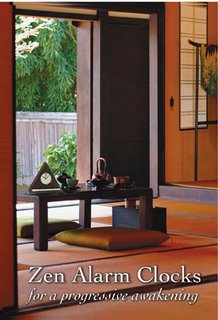 Tea Ceremonies for Relaxation, tea timers with chime by Now & Zen Now & Zen – Chime Timers and Alarm Clocks
1638 Pearl Street
Boulder, CO 80302
(800) 779-6383
Posted in intention, Meditation Timers, Tea Ceremony, Zen Timers
 Brain Aid -- Meditation and Yoga
Science has proven that meditating actually restructures your brain and can train it to concentrate, feel greater compassion, cope with stress, and more.Read the latest research and put it into practice.Yoga citta vritti nirodhah. Yoga is the ending of disturbances of the mind. (Yoga Sutra, I.2)
Nothing is quite as satisfying as a yoga practice that’s filled with movement. Whether you prefer an intense and sweaty vinyasa practice, a gentle but deliberate Viniyoga practice, or something in between, all systems of hatha yoga provide a contented afterglow for the same reason: You sync your movement with your breath. When you do, your mind stops its obsessive churning and begins to slow down. Your attention turns from your endless to-do list toward the rhythm of your breath, and you feel more peaceful than you did before you began your practice.
For many of us, accessing that same settled, contented state is more difficult to do in meditation. It’s not easy to watch the mind reveal its worries, its self-criticism, or its old memories. Meditation requires patience and—even more challenging for most Westerners—time. So, why would you put yourself through the struggle?
Quite simply, meditation can profoundly alter your experience of life. Thousands of years ago the sage Patanjali, who compiled the Yoga Sutra, and the Buddha both promised that meditation could eliminate the suffering caused by an untamed mind. They taught their students to cultivate focused attention, compassion, and joy. And they believed that it was possible to change one’s mental powers and emotional patterns by regularly experiencing meditative states. Those are hefty promises.
But these days, you don’t have to take their word for it. Western scien-tists are testing the wisdom of the masters, using new technology that allows researchers to study how meditation in-fluences the brain.
 Meditating to the rescue
The current findings are exciting enough to encourage even the most resistant yogis to sit down on the cushion: They suggest that meditation—even in small doses—can profoundly influence your experience of the world by remodeling the physical structure of your brain.
Although meditation can be done in almost any context, practitioners usually employ a quiet, tranquil space, a meditation cushion or bench, and some kind of timing device to time the meditation session. Ideally, the more these accoutrements can be integrated the better. Thus, it is conducive to a satisfying meditation practice to have a timer or clock that is tranquil and beautiful. Using a kitchen timer or beeper watch is less than ideal. And it was with these considerations in mind that we designed our digital Zen Alarm Clock and practice timer. This unique “Zen Clock” features a long-resonating acoustic chime that brings the meditation session to a gradual close, preserving the environment of stillness while also acting as an effective time signal.
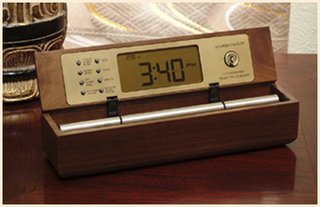 Digital Zen Alarm Clock - A Meditation Timer and Alarm Clock adapted from Yoga Journal, by Kelly McGonigal
Now & Zen’s Meditation Timer Store
1638 Pearl Street
Boulder, CO 80302
(800) 779-6383
Posted in Chime Alarm Clocks, intention, Meditation Timers, Meditation Tools, Well-being, zen, Zen Timers
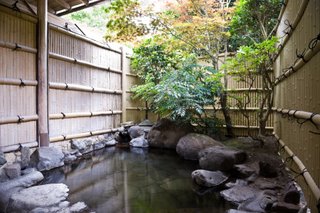 sacred soaking Water, a powerful and restorative element in exquisite rituals throughout the ages, finds itself front and center in most spiritual rites of passage. Many cultures consider water essential for both physical and spiritual cleansing, and millions continue to embark upon quests to holy rivers and healing springs, drawn to water equally for its soothing properties as well as its promise of purification.
Perhaps this draw to water feels so instinctual because our brains, blood, and even our muscles are composed mainly of water. When we submerge ourselves, we return, in essence, to a deep, primordial connection with the world around us. Through the simple act of bathing, we can celebrate this ancient relationship between water and life. With minimal effort, a daily bath becomes a meditative and mystical experience, helping us to connect with our own inner wisdom.
“Mankind has used water to restore the physical, mental, and emotional body since ancient times,” says Barbara Close, founder of Naturopathica Holistic Health and author of Pure Skin: Organic Beauty Basics (Chronicle Books, 2005). “From the beginning, the use of water as a conduit or healing agent has existed for both its physical and emotional healing properties.”
Long before holy wells began to draw pilgrims or the custom of “taking the waters” became popular at lavish bathing halls in Europe, ancient cultures in Asia, Indonesia, and Mesoamerica had their own elaborate bathing rituals, which often involved the use of steam and ceremonial sound. Both the Aztec Temazcal and Mayan Zumbul-che wove in musical elements to signify the start of the cleansing ritual. In parts of today’s world, including Indonesia, Southeast Asia, and island nations of the Pacific, cultures still associate wells, springs, and rivers with the Goddess, the feminine principle, and birth. Women add flower petals to ritual water as an extra flourish, imbuing their bath with the powerful spiritual energy associated with native plants. In the Javanese bath ritual that prepares brides for their wedding night, attendants first scrub and exfoliate the skin with turmeric and then rub it with yogurt to soften it. A luxurious bath with flowers and petals follows, and only then is the bride deemed purity incarnate.
 water “Each and every one of us, and every fragment of life on our planet, has an inner and outer relationship with water,” says Nadine Epstein, author (with Rosita Arvigo) of Spiritual Bathing: Healing Rituals and Traditions From Around the World (Celestial Arts, 2003). “The first living cells were formed in the salt bath of the sea, and I love imagining the blood that flows within us as a kind of internal sea. We are beings of water on a planet that is distinguished by its possession of water, the rushing waters that the early Jews called ‘living waters’ or mayyim hayyim.”
Ritual and renewal
You can connect with the healing energy of water by preparing your own spiritual bath at home. First order of business: Decide what you want to manifest in your life. The prospects run the gamut from the desire to release personal sadness or frustration to the hope of reducing global suffering. Next, establish the mood. The usual suspects, candles and incense, have traditionally been part of many prayer settings, but let your imagination run wild. Create an even richer ambiance by including specific music, scents, symbols, and images that resonate with your concept of the divine.
“Personally, I love singing and chanting on the surface of the water, watching the ripples of my breath, and soaking up the sounds in the air,” says Epstein. “I’ve always been fascinated by sound waves and how they travel through solids, gases, and liquids. As a little girl, I remember my father, a physicist, mapping the trajectory of sound waves through crystals. The symmetries of these waves were and are a beautiful thing to behold. It all boils down to connecting with what the Maya call ch’ulel, the Chinese call chi, the Hindus call prana. Nearly every culture has a name for the subtle energies or vibrations that exist within us and beyond.”
Ultimately, only the reverence with which we enter the water matters. If we are receptive enough, our immersions can gradually wring a sea change upon our spirit, teaching us that we can learn as much from floating as we can from standing on firm ground.
Although meditation can be done in almost any context, practitioners usually employ a quiet, tranquil space, a meditation cushion or bench, and some kind of timing device to time the meditation session. Ideally, the more these accoutrements can be integrated the better. Thus, it is conducive to a satisfying meditation practice to have a timer or clock that is tranquil and beautiful. Using a kitchen timer or beeper watch is less than ideal. And it was with these considerations in mind that we designed our digital Zen Alarm Clock and practice timer. This unique “Zen Clock” features a long-resonating acoustic chime that brings the meditation session to a gradual close, preserving the environment of stillness while also acting as an effective time signal.
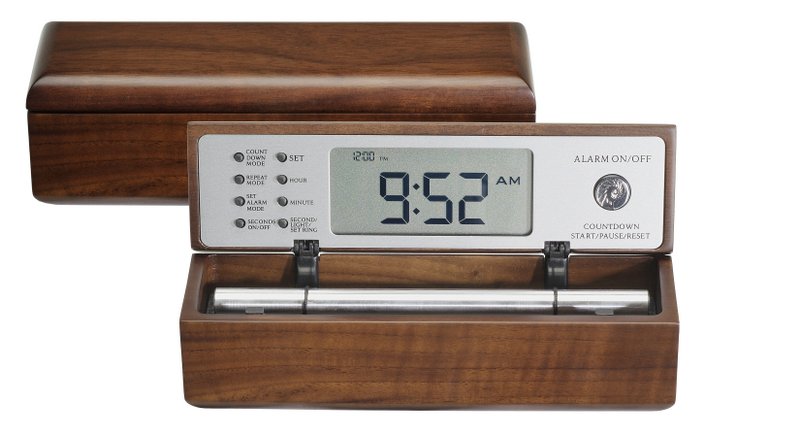 Portable Zen Timer with Chime by Now & Zen, Inc. adapted from Natural Solutions Magazine, March 2007 by Debra Bokur
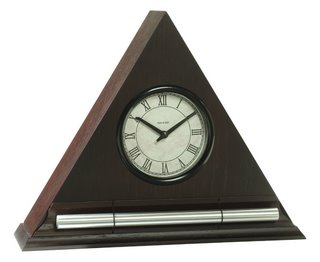 Natural Sound Alarm Clock with Chime Now & Zen’s Portable Meditation
Timer Store
1638 Pearl Street
Boulder, CO 80302
(800) 779-6383
Posted in Hot Springs, intention, Meditation Timers, Meditation Tools, mindfulness practice, Well-being
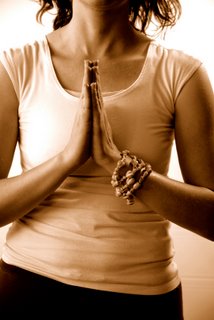 wellbeing The longer you sit at your desk, the more your posture resembles the curved, compressed arch of a camel’s hump — and the more uncomfortable you feel. Your back stands to suffer long-term misalignment as a result of slumping, while the resulting impaired breathing can lead to chronic muscle tension and drag your energy level down.
With its emphasis on core strength and alignment, Pilates counters these stresses by helping you look — and feel — a little taller. “This particular fitness discipline aims to create stability and freedom through the entire body by targeting the muscle groups that support the spine,” says New York City-based fitness and Pilates instructor James Darling. That includes the muscles deep within the back, abdomen, and pelvis. By focusing equally on strengthening and lengthening, the following Pilates favorites will foster a buoyant support system for your spine, bringing deeper breathing, more energy, and posture that’s both graceful and effortless.
Spine Stretch Forward
What It Does
Creates space between the vertebrae, lengthens the muscles of the back, and reduces lower back pain. Counteracts stress by calming the nervous system.
How to Do It
Sit on the floor with legs straight and spine tall. Drop your chin into your chest and contract your core, as if you’re trying to curl your torso up and over a beach ball. Focus on drawing your center in as opposed to curving your spine. Rest your hands where they fall, and breathe here for 30 seconds to a minute, use your Zen Timer to repeast the process with the “repeat mode”. Slowly roll back up to the starting position. Repeat six times.
adapted from Body + Soul, October 2008
Use our unique “Zen Clock” which functions as a Yoga Timer. It features a long-resonating acoustic chime that brings your meditation or yoga session to a gradual close, preserving the environment of stillness while also acting as an effective time signal. Our Yoga Timer & Clock can be programmed to chime at the end of the meditation or yoga session or periodically throughout the session as a kind of sonic yantra. The beauty and functionality of the Zen Clock/Timer makes it a meditation tool that can actually help you “make time” for meditation in your life. Bring yourself back to balance.
 Bowl Gong Timer and Alarm Clock for a Gentle Wake UP Now & Zen’s Yoga Timer Store
1638 Pearl Street
Boulder, CO 80302
(800) 779-6383
Posted in intention, Meditation Timers, Meditation Tools, mindfulness practice, Walking Meditation, Well-being, Zen Timers
 create a sacred place to be mindful Is there a place in your home or yard where you can let go, relax, and renew your awareness of transcendent, loving oneness? It doesn’t take much to create such a place.
Your can create your healing retreat —a garden, a teahouse, a room—or you can claim one that already exists—a window seat, a rock by a stream. Your haven can be a balcony with potted plants and a wind chime, a hot tub surrounded by lavender, a bedroom where you have banished all distractions, or a comforter you roll up in like a cocoon. It needn’t even be a particular place; it can be an experience you recreate each time you need it, like a candlelight bubble bath with fresh flowers and Mozart.
There are no rules about how to create a personal haven, but consider incorporating some of these features (let your heart and your gut guide you):
• A gateway or marked entry to set it aside as sacred
• Privacy (freedom from interruptions and demands)
• A place to rest (a bed, hammock, comfortable stool)
• Calming colors
• Curved shapes
• Soft textures
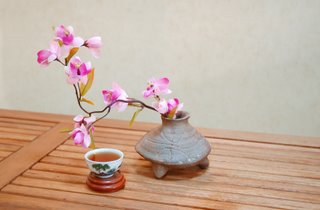 create a sacred space in your house • Plants
• Objects of beauty
• Simplicity, absence of clutter
• Soothing sounds (birdsong, moving water, music, wind chimes)
• Sunlight or soft, warm electric light
• Pleasing scents
• The four elements: air, earth (the ground, stones), water (in a bowl, fountain, or body of water), fire (sun, candles, a fire)
• A long vista, if there’s a pleasant one available
• Symbols of calm, transcendence, love, nourishment (hearts, stars, sun, moon, angels, personal treasures)
You deserve it
If you are like most people, the hardest part isn’t finding or creating a sanctuary; it’s believing that you deserve to spend time there. We tend to be so overwhelmed with demands that time taken away from meeting them feels like time wasted. We somehow learned that doing something just because it feels good is detrimental to others. Question these assumptions.
In fact, great inspiration, beautiful works of art, and profound love arise from the experience of unstructured time. In quiet, we can hear our muses and feel our passions. Here we can dream freely and drink from the deep well of our source. The peace we find carries into all our actions and relationships. What better gift can we give the world?
Although meditation can be done in almost any context, practitioners usually employ a quiet, tranquil space, a meditation cushion or bench, and some kind of timing device to time the meditation session. Ideally, the more these accoutrements can be integrated the better. Thus, it is conducive to a satisfying meditation practice to have a timer or clock that is tranquil and beautiful. Using a kitchen timer or beeper watch is less than ideal. And it was with these considerations in mind that we designed our digital Zen Alarm Clock and practice timer. This unique “Zen Clock” features a long-resonating acoustic chime that brings the meditation session to a gradual close, preserving the environment of stillness while also acting as an effective time signal.
 Bamboo Meditation Timers and Alarm Clocks
adapted from Natural Home Magazine, January/February2004 by Carol Venolia
 interiors that create well-being Now & Zen
1638 Pearl Street
Boulder, CO 80302
(800) 779-6383
Posted in Beauty, Chime Alarm Clocks, intention, Japanese Inspired Zen Clocks, Meditation Timers, Meditation Tools, mindfulness practice, Well-being, Zen Timers
« Previous Page — « Previous Entries
Next Entries » — Next Page »
|
|
|
|